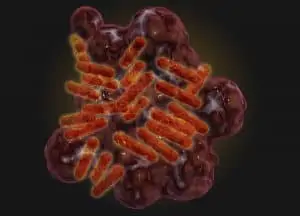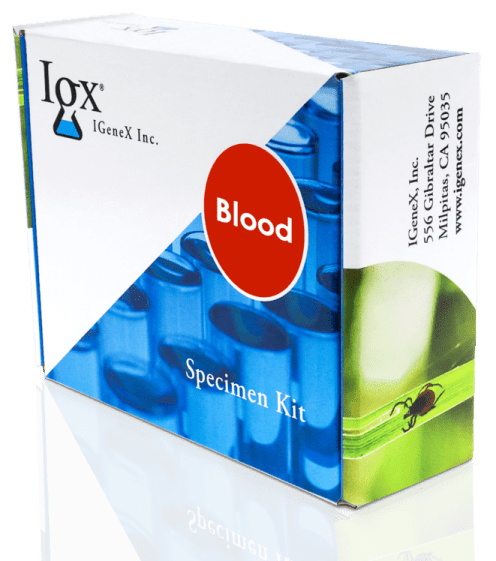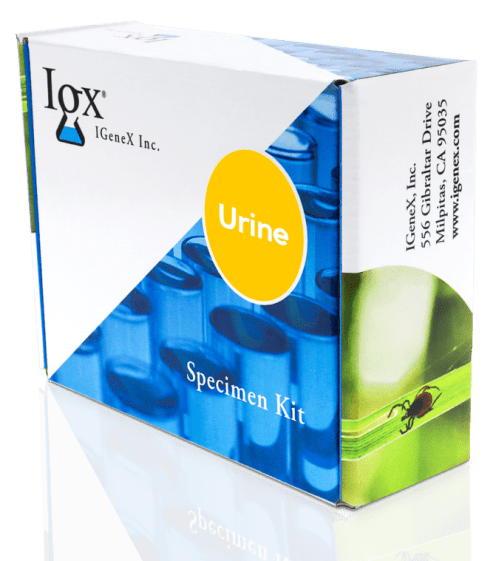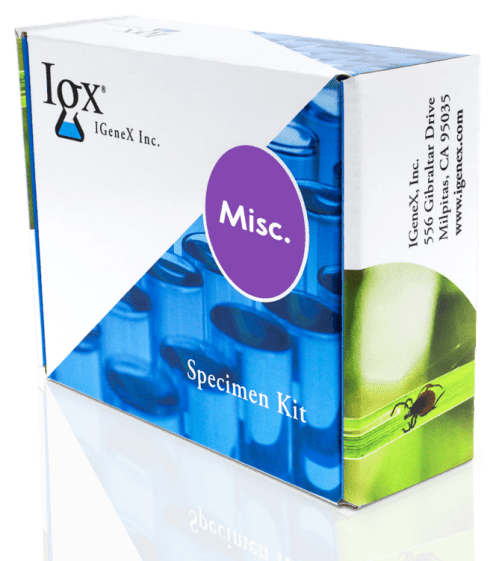Diagnostic Tests for Rickettsia
The diagnosis of Rickettsiosis (Rocky Mountain Spotted Fever) is difficult to make clinically for patients because the symptoms are non-specific. IGeneX offers the following Rickettsia antibody tests listed below to help physicians accurately detect Rickettsia. To learn more about Rickettsia, including symptoms and prevalence, please read IGeneX’s overview of Rickettsiosis.
WHAT TESTS ARE AVAILABLE FOR RICKETTSIA?
IGeneX offers IFAs (Indirect Immunofluorescent Assay) and PCRs (Polymerase Chain Reaction), and Culture Enhanced PCR (cePCR) to confirm the diagnosis of Rickettsiosis.
Rickettsia rickettsii/typhi IgG Antibody Test

The Rickettsia Immunofluorescent Assay (IFA) is designed to detect Rickettsia-specific antibodies in human serum. For diagnostic purposes, IFA test results should be used in conjunction with other data available to the diagnosing physician.
Principle
The Rickettsia IFA assay is a two-stage sandwich assay, based upon an antigen-antibody complex formation in the following steps:
- Binding of anti-Rickettsia-specific antibodies in human serum to fixed Rickettsia
- Binding of fluorescent-labeled anti-human IgG/IgM antibodies to the human anti-Rickettsia antibodies bound to Rickettsia on the slide
- Identifying green fluorescing Rickettsia organisms with a fluorescent microscope
Reference Range
Rickettsia antibody titers IgG <40
Clinical Significance
The Rickettsia IFA detects antibodies to Rickettsia species in human serum. These species include R. ricketsii and R. typhi, known to cause Rocky Mountain Spotted Fever and Murine Typhus. Titers rise during the first two-to-four weeks of illness and decline over the next six-to-12 months. In patients with previously high titers, titers of less than 160 may indicate a resolving infection. If the IFA result is negative, but the clinical symptoms are present, polymerase chain reaction (PCR) testing is suggested.
Stage of Disease
Any Stage of Disease (Early to Late/Chronic Stage)
Rickettsia PCR Panel Whole Blood
The polymerase chain reaction (PCR)-based diagnostic assay for detection of Rickettsia from blood is highly specific to R. rickettsii and R. felis/typhi DNAs. The combination of the following three steps imparts a very high specificity and sensitivity to the test:
- Hybridization/selection
- Amplification of Rickettsia-specific DNA
- Detection of Rickettsia-specific amplified DNA fragments
Reference Range
R. rickettsii: Negative, R. rickettsii-specific DNA not detected
R. felis/typhi: Negative, R. felis/typhi-specific DNA not detected
Clinical Significance
The Rickettsia species PCR test is an assay that detects Rickettsia species-specific DNA in clinical samples. Rickettsia 17 kDa antigen gene fragments are hybrid-selected by probes, followed by PCR amplification of the selected DNA fragment. Southern blot assays test PCR products with Rickettsia-specific probes (R. rickettsii and R. felis/typhi). The primers and probes used for the selection of Rickettsia gene fragments encoding the 17 kDa antigen DNA fragments are designed from published sequences.
Limitations
- This test should only be performed in conjunction with southern blot assays.
- Results should be interpreted in conjunction with other laboratory and clinical findings.
- Test results can only help the physician in confirming a clinical Rickettsia diagnosis.
Stage of Disease
Any Stage of Disease (Early to Late/Chronic Stage)
Rickettsia cePCR - New!
Culture testing is widely considered to be the “gold standard” for diagnosis of Rickettsia. For many years, Rickettsia cultures were too expensive and tedious to be practical for laboratory use. Until now. After many years of research and development, IGeneX is pleased to introduce cePCR (Culture-Enhanced PCR) for Rickettsia.
Download the cePCR datasheet >
Principle
In culturing, a clinical sample from the body (e.g. blood) is incubated in media.
During this incubation period, micro-organisms in the sample grow and multiply. The sample is then tested by PCR to identify the pathogens.
Advantages of Culture-Enhanced PCR
• Provides higher sensitivity than standard PCR testing.
• The only 100% specific method for identification of Rickettsia.
• Obtaining cultures before antibiotic use improves the chances of identifying the offending microorganism, which improves patient care.
Stage of Disease
Any stage
Complete Test Directory
THE DIRECTORY
GET STARTED TODAY!
The first step in getting tested with IGeneX is to order a collection kit. Choose between a Blood, Urine, or Miscellaneous kit. Doctors can order unlimited quantities of kits at no charge. Patients are required to deposit $20, which is applied to the testing fees.







